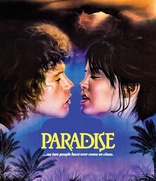Paradise Blu-ray Movie
HomeParadise Blu-ray Movie 
Fun City Editions | 1982 | 102 min | Rated R | Nov 12, 2024Price
List price:Amazon: $17.99 (Save 40%)
Third party: $17.99 (Save 40%)
Only 1 left in stock (more on the way).
Movie rating
6.3 | / 10 |
Blu-ray rating
| Users | 4.0 | |
| Reviewer | 4.0 | |
| Overall | 4.0 |
Overview
Paradise (1982)
Two teenagers living in the Victorian era are traveling from Baghdad to Damascus when their party is attacked and all of the adults are killed. After the two are taken prisoner by a sheik, they manage to escape, and alone in the desert they discover love, sex and how to survive.
Starring: Phoebe Cates, Willie Aames, Tuvia Tavi, Joseph Shiloach, Richard CurnockDirector: Stuart Gillard
| Romance | Uncertain |
| Drama | Uncertain |
| Teen | Uncertain |
| Adventure | Uncertain |
Specifications
Video
Video codec: MPEG-4 AVC
Video resolution: 1080p
Aspect ratio: 1.85:1
Original aspect ratio: 1.85:1
Audio
English: DTS-HD Master Audio 2.0 (48kHz, 24-bit)
English: DTS-HD Master Audio 2.0 (48kHz, 24-bit)
Theatrical Mix + Pre-Release Mix
Subtitles
English SDH
Discs
Blu-ray Disc
Single disc (1 BD)
Packaging
Slipcover in original pressing
Playback
Region A, B (C untested)
Review
Rating summary
| Movie | 2.5 | |
| Video | 4.0 | |
| Audio | 4.0 | |
| Extras | 3.0 | |
| Overall | 4.0 |
Paradise Blu-ray Movie Review
Reviewed by Brian Orndorf December 5, 2024I don’t believe anyone was more shocked by the success of 1980’s “The Blue Lagoon” than the very people who made the picture. A small feature aimed at a teenage audience, “The Blue Lagoon” managed to attract all demographics with its depiction of island survival and sexual awakening, becoming a phenomenon and the ninth highest-grossing release of the year (sandwiched between “Smokey and the Bandit II” and “The Blues Brothers”). The stars of the endeavor, Brooke Shields and Christopher Atkins, also became media sensations, encouraging the creation of a devoted fanbase. Obviously, other producers weren’t going to miss a chance to cash-in on something so red-hot, paving the way to the creation of 1982’s “Paradise,” which once again pairs a curly-haired young man and a straight-haired young woman, capturing their trials and offerings of nudity while exploring a little corner of the world on their own. Writer/director Stuart Gillard (“Teenage Mutant Ninja Turtles III,” “WarGames: The Dead Code”) is under strict orders to stay close to the highlights of the 1980 effort, also laboring to expand the adventure elements of the plot. He’s also greatly in love with supporting turns from chimpanzees, representing one of several puzzling creative choices in this ineffective knock off, which has a great deal of difficulty trying to get through a simple study of sexploitation and nature’s ways.
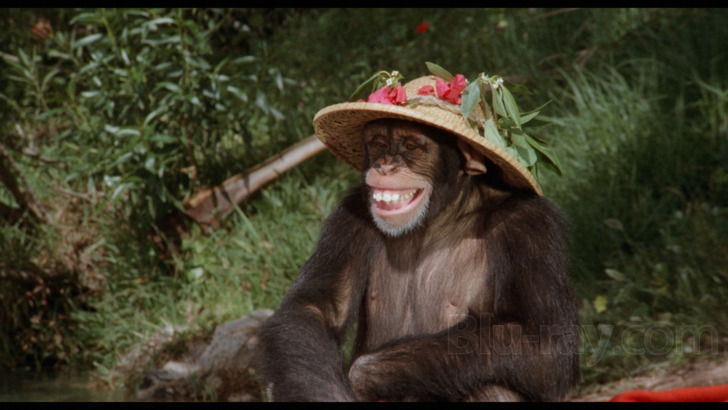
It's 1823, and Sarah (Phoebe Cates) is touring Baghdad, joined by her handler, Geoffrey (Richard Curnock), getting a sense of the area. Noticing her beauty is El- Aziz (Tuvia Tavi), a vicious local slaver nicknamed “The Jackal” who wants to claim Sarah for his own purposes, only to fail at his first pass. Also in town is David (Willie Aames), the son of Christian missionaries, who notices Sarah as well. Plans are made to travel to Damascus, sending a camel caravan into the deep desert. El-Aziz’s gang eventually finds them, slaughtering David’s parents, leaving the young man with Sarah and Geoffrey in the middle of nowhere, hunting for water and shelter. When The Jackal strikes again, the teens are left on their own, locating a secluded coastal area they name “Paradise.” As time passes, David and Sarah learn to appreciate each other and avoid outside detection, also joined by Doc, a friendly chimpanzee who stays with the twosome. The lure of feelings and adolescent developments soon come calling, keeping David and Sarah close together as they form a sexual relationship.
“Paradise” examines the age-old struggle of children fighting the futures planned out for them without their input. However, this is 1823, and parental demands are a bit more dominant, finding Sarah prepared for society when she leaves the Middle East, and David is pushed into the ministry, following his father’s footsteps. He’s a repressed teen hounded by reminders of sin, but Gilliard also develops his adolescent appetites, enjoying peeping time around Sarah as she bathes, which is a common occurrence in the feature. The pair meet in Baghdad, and the writing arranges a silent movie-style battle of local brutes and the beauty they wish to possess, though El-Aziz isn’t really a major antagonist in the endeavor. He’s more of an occasional threat, popping up to keep the characters on the run, as the story is largely invested in the developing relationship between young people who have little understanding of their primal appetites.
David and Sarah are eventually left to endure in the desert heat, losing all escorts and camel along the way. “Paradise” settles into “Blue Lagoon” mode in the second act, watching the pair discover a coastal area that’s open for settlement, becoming a couple out of necessity. David learns to develop as a hunter, taking to the bow and arrow to acquire food, also building a hut. Sarah maintains domestic order and crafts a flute. They often frolic around the area and visit watery depths for fish and fun, and this footage is captured with noticeably older cameras, making it look like a Cypress Gardens commercial from its opening year. Sexual development is also addressed, as Sarah develops breasts and David grows tired of masturbation, getting past his Christian teachings to start desiring his partner as more than a basic companion. Gilliard gets his fill of Aames and Cates in and out of clothing, working hard to maintain the exploitation elements of the production. He’s certainly less interested in performances, reaching the limit of Aames’s appeal early before keeping the actor in a weird state of rage for most of the picture, inadvertently turning a relationship envisioned as something sweet into something emotionally abusive.
There’s a problem with chimpanzees in “Paradise.” For some reason, the feature introduces Doc to the story, bringing in a creature to possibly distract from a lack of chemistry between Cates and Aames, and Gillard repeatedly returns to the animal for comedic purposes. Doc is eventually joined by Eve, another chimp, adding more unnecessary goofiness to the effort, helping to drag the viewing experience down. Not aiding the cause is composer Paul Hoffert, who goes full cartoon with his music, determined to add exaggerated scoring to every moment in “Paradise.”
Paradise Blu-ray Movie, Video Quality 
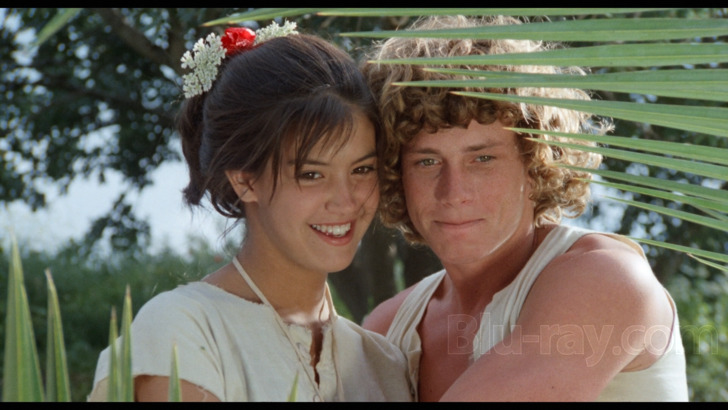
The AVC encoded image (1.85:1 aspect ratio) presentation for "Paradise" offers a decent sense of detail throughout the adventure. Skin particulars, the big showcase for the feature, are intact, with plenty of time devoted to half-naked stars, while supporting character retain displays of age. Chimpanzee fur and features are also appreciable. The wide open world of the movie retains depth, protecting desert and coastal expanse. Interiors are rare, but also carry dimension. Skin tones are natural on humans and animals. Desertscapes deliver brightness and defined hues, matched with blue waters. Costuming brings out some varied looks, and reds are distinct. Delineation is satisfactory. Grain is heavier and film-like. Source is in good condition.
Paradise Blu-ray Movie, Audio Quality 
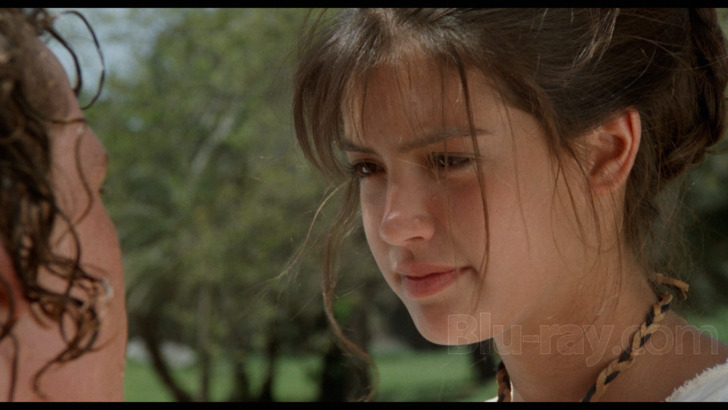
The 2.0 DTS-HD MA mix secures clear dialogue exchanges, preserving argumentative moments and sensitive encounters with decent balance. Scoring supports with sharp instrumentation, exploring all sorts of comedic and melodramatic moods. Sound effects are acceptable. Also available is a music- only track and a "pre-release" mix, though what this is exactly isn't explained. One noticeable change is found in the end credits, which retain a film score while the theatrical release version of "Paradise" offers a closing Phoebe Cates pop song.
Paradise Blu-ray Movie, Special Features and Extras 
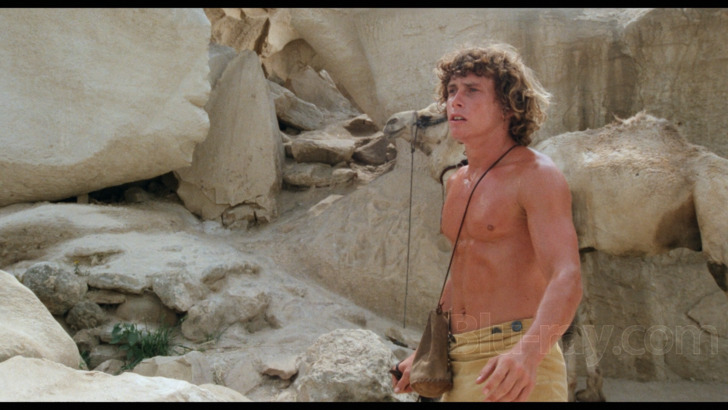
- Booklet (14 pages) contains essays by Amanda Reyes and Margaret Barton-Fumo.
- Commentary features film historian Nathaniel Thompson.
- VHS Version (96:17, SD) of "Paradise" is included.
- Image Gallery (7:31) collects poster art, film stills, publicity shots, lobby cards, music single covers, press kit pages, and magazine articles.
- Radio Spots (2:16) offer three ads for "Paradise."
- T.V. Spot (:42, HD) contains a single commercial for the film.
- And a Red Band Theatrical Trailer (2:47, HD) and a Green Band Theatrical Trailer (2:33, HD) are included.
Paradise Blu-ray Movie, Overall Score and Recommendation 
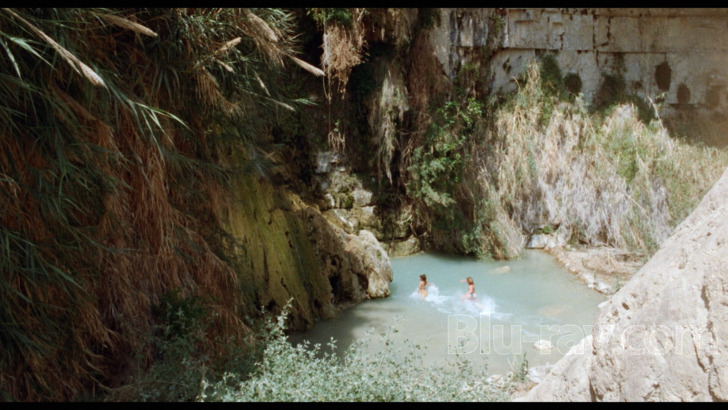
"Paradise" achieves a few of its creative goals, including a deflowering sequence that's treated as event cinema. The story heads in a familiar direction, putting David and Sarah on the run from Al-Aziz and his soldiers, but Gillard isn't terribly invested in escalating suspense, oddly burning through a development that has Sarah taken by The Jackal, only to be rescued a few minutes later. So much for that. Of course, the point of "Paradise" isn't dramatic potential. Gillard is tasked to keep his main actors glistening and nude, and there's plenty of that in the movie. However, it certainly wouldn't hurt to have a compelling understanding of the central partnership, with this copycat forgoing the passable pubescent dewiness of "The Blue Lagoon" for a harsher relationship and 100% more chimpanzee zaniness.
Similar titles
Similar titles you might also like

God's Own Country
2017

Anna Christie
Warner Archive Collection / Includes German-Language Alternate Version
1930

Only Angels Have Wings
1939

My Blueberry Nights
2007

The Blue Lagoon
Limited Edition to 3000 - SOLD OUT
1980

Not Easily Broken
2009

Tabu: A Story of the South Seas
1931

By the Sea
2015

American Honey
2016

Millie
1931

Brooklyn
2015

Desert Hearts
1985

Fanny
1961

Morocco
1930

Tootsie
1982

Bird of Paradise
1932

The Four Feathers
1939

The Lady Refuses
1931

The Woman Between
1931

Sullivan's Travels
1941
